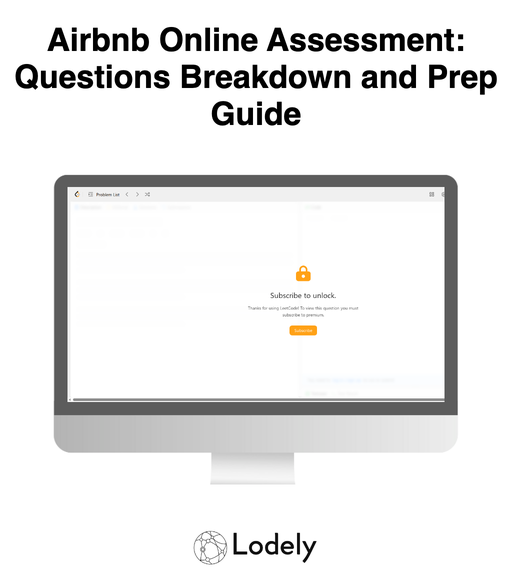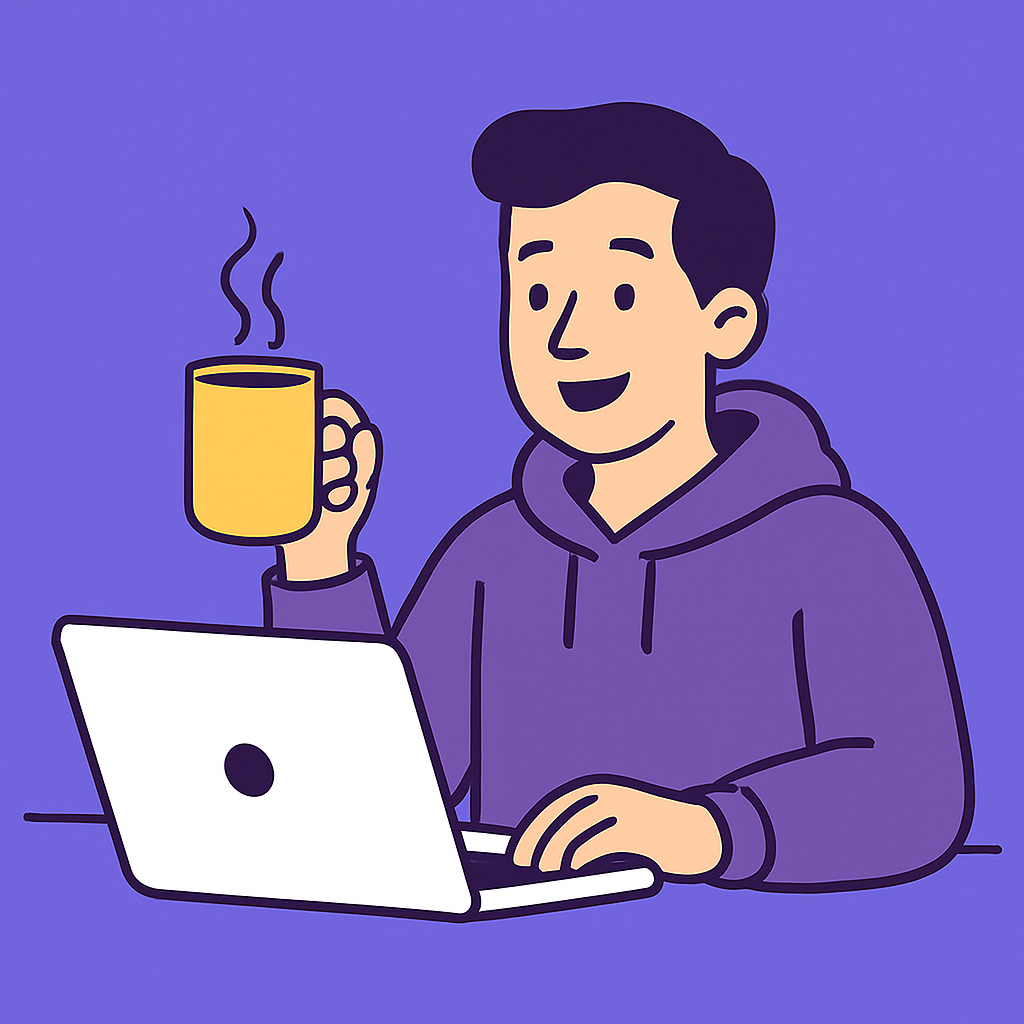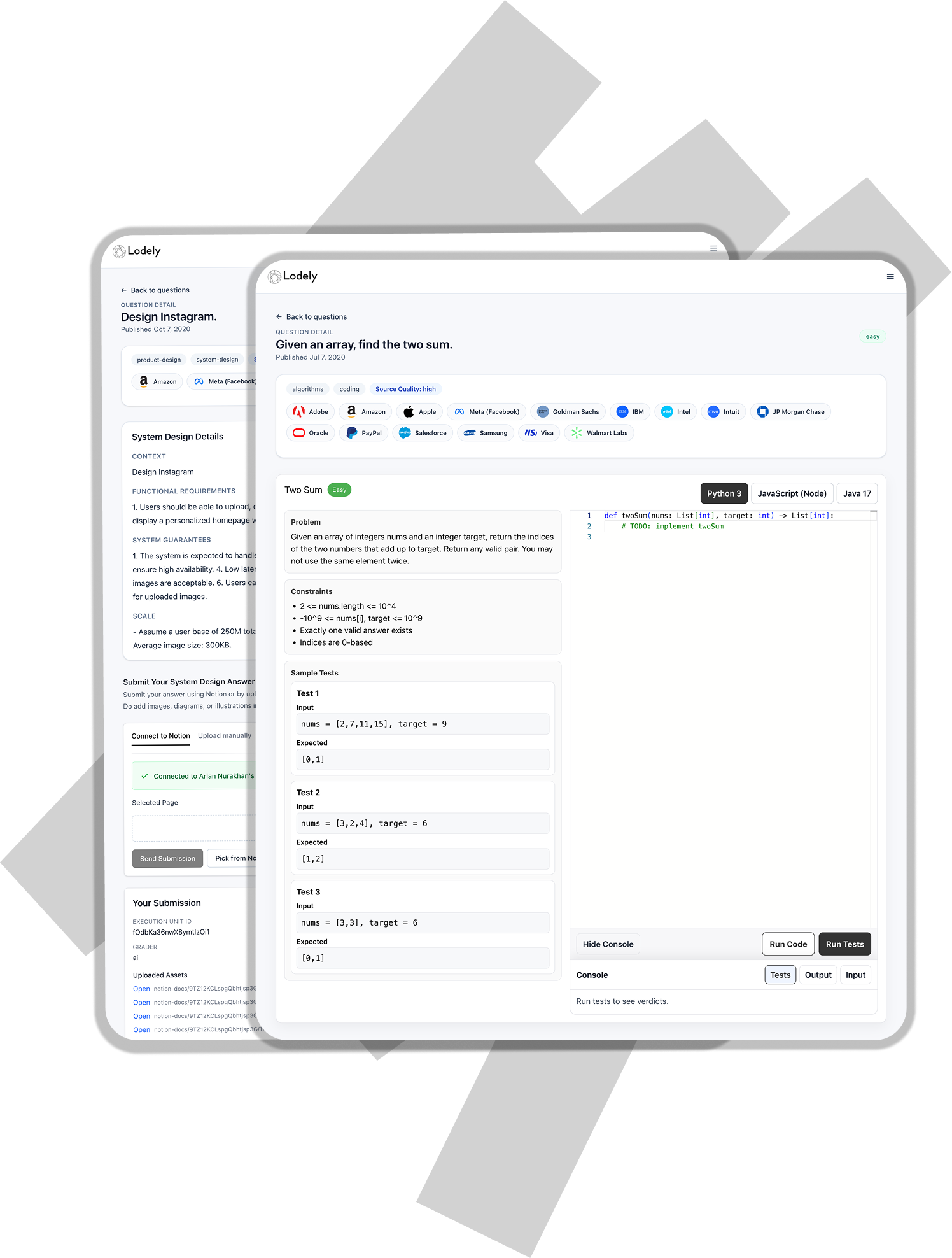Airbnb Online Assessment: Questions Breakdown and Prep Guide
Thinking about “Cracking Airbnb’s Assessment” but not sure what you’re walking into? You’re not alone. Engineers dread the mix of algorithms, marketplace-flavored edge cases, and time pressure — and the hardest part is knowing what to practice.
If you want to walk into the Airbnb Online Assessment (OA) confident, prepared, and ready to deliver, this guide is your playbook. No fluff. Real breakdowns. Strategic prep.
When to Expect the OA for Your Role
Airbnb doesn’t run a one-size-fits-all OA. The format and timing can vary by role, level, and region.
- New Grad & Intern Positions – Most applicants receive an OA soon after a recruiter screen. For university roles, it’s commonly the sole technical filter before final rounds.
- Software Engineer (Backend / Full-Stack / Frontend / Mobile) – Standard. Expect a HackerRank or CodeSignal link. Content is data structures and algorithms with marketplace-tinted scenarios.
- Data Engineering / ML / Analytics – You’ll still get coding, but may see SQL, ETL-style transforms, or “log dedup within time windows” flavors.
- SRE / Infra / Platform – Algorithmic OA plus practical twists (caching, rate limiting, load-aware scheduling).
- Senior Engineering Roles – Some candidates move straight to live interviews, but an OA is still used as a first screen for many.
- Non-Engineering Roles – Rare. When it appears, it’s typically logic or analytical exercises.
Action step: When the recruiter reaches out, ask for the platform, duration, number of questions, and whether it’s proctored. That alone can shape your prep.
Does Your Online Assessment Matter?
Short answer: yes — more than most candidates think.
- It’s the main gate. A strong resume earns the invite; your OA performance unlocks the loop.
- It sets the tone. Your OA code can be shared internally and inform later interviews.
- It’s realistic. Airbnb’s marketplace reality shows up: calendars, intervals, search ranking, pricing rules, and geo queries.
- It signals how you work. Clear variables, sensible complexity, and resilient edge-case handling matter.
Pro Tip: Treat the OA as your first interview. Write clean, readable code, add lightweight comments, and cover edge cases even if the platform doesn’t require them.
Compiled List of Airbnb OA Question Types
You won’t get the exact problems below, but these patterns map closely to what Airbnb cares about. Practice them:
- Meeting Rooms II — type: Intervals / Heap (booking conflicts, minimum rooms)
- Insert Interval — type: Intervals / Merge (calendar availability)
- Merge Intervals — type: Intervals / Sorting (cleaning buffers, policy windows)
- K Closest Points to Origin — type: Geometry / Heap (nearest listings by coordinates)
- Design Hit Counter — type: Queue / Sliding Window (rate limiting, request throttling)
- Top K Frequent Elements — type: Heap / Hash Map (search ranking, trending listings)
- Autocomplete System — type: Trie / Heap (query suggestions with weights)
- Minimum Window Substring — type: Sliding Window / Strings (filter constraints for search)
- Number of Islands — type: DFS / BFS (map clustering, connected regions)
- LRU Cache — type: Design / Hash + Doubly Linked List (caching listing details)
- Task Scheduler — type: Greedy / Heap (cooldowns between actions)
- Valid Palindrome II — type: Two Pointers (input normalization, tolerance rules)
- Evaluate Division — type: Graph / DFS (conversion/relationship queries)
- Fraction to Recurring Decimal — type: Math / Precision (pricing and rounding edge cases)
How to Prepare and Pass the Airbnb Online Assessment
Think of your prep as building reflexes, not memorizing answers.
1. Assess Your Starting Point (Week 1)
List your strengths (arrays, hashing, strings) and gaps (graphs, geometry, intervals). Run a timed set on LeetCode or CodeSignal practice to get a baseline. This clarifies your next four weeks.
2. Pick a Structured Learning Path (Weeks 2-6)
You have options:
- Self-study on LeetCode/HackerRank
- Best for disciplined learners. Focus on intervals, heaps, sliding window, and map/geo flavors.
- Mock assessments / bootcamps
- Timed, proctored simulations help with pacing and anxiety.
- Career coach or mentor
- A software engineer career coach can critique code clarity, complexity trade-offs, and communication.
3. Practice With Realistic Problems (Weeks 3-8)
Build a 40–60 problem set around Airbnb-style topics: interval scheduling/merging, heaps for “top K,” tries for autocomplete, sliding windows for constraints, geo-adjacent logic. Timebox each session, then refactor for readability.
4. Learn Airbnb-Specific Patterns
Expect marketplace-driven twists:
- Calendar logic: merge intervals, detect booking conflicts, apply minimum-night rules or buffer days.
- Ranking and search: top-K queries, autocomplete with historical weights, pagination under constraints.
- Geo reasoning: nearest neighbors, bounding boxes, distance calculations (Haversine).
- Pricing and precision: fees, taxes, rounding modes, currency-safe arithmetic.
- Rate limiting and dedup: sliding windows, idempotency, log dedup within time bounds.
5. Simulate the OA Environment
Use HackerRank or CodeSignal’s practice IDE. Turn off distractions, set the real time limit (often 70–90 minutes for 2–3 questions), and try one-shot runs. Some OAs are proctored — rehearse in a quiet, well-lit space.
6. Get Feedback and Iterate
Revisit your solutions the next day. Track repeated mistakes (off-by-one in intervals, heap misuse, precision issues). Share with peers or mentors, and rewrite the ugliest solution each week.
Airbnb Interview Question Breakdown

Here are featured sample problems inspired by Airbnb’s OA patterns. Master these and you’ll cover a lot of ground.
1. Booking Calendar Conflicts with Cleaning Buffers
- Type: Intervals / Sorting
- Prompt: Given existing reservations and a proposed new reservation, determine if it can be booked when each reservation requires a 1-day cleaning buffer before and after.
- Trick: Expand intervals to include buffers, then check overlap in O(n log n) via sorting or O(n) with a sweep line.
- What It Tests: Interval modeling, careful edge handling (inclusive/exclusive bounds), and translating product rules into code.
2. K Nearest Listings to a Map Center
- Type: Geometry / Heap
- Prompt: Given N listing coordinates and a current map center, return the K nearest listings. Assume Earth coordinates; approximate with Euclidean distance for small areas or use Haversine if distances matter.
- Trick: Use a max-heap of size K to keep nearest candidates in O(n log k). Avoid sqrt when possible by comparing squared distances.
- What It Tests: Heap mastery, numerical stability, and trade-offs between accuracy and performance.
3. Search Autocomplete with Popularity Weights
- Type: Trie / Heap
- Prompt: Build an autocomplete that returns top 3 suggestions for a prefix, ranked by usage count (and lexicographically to break ties).
- Trick: Maintain a trie with a small heap at each node, or compute results on-the-fly with a hash + heap; mind memory–speed trade-offs.
- What It Tests: Data structure design, incremental updates, and ranking logic.
4. Request Rate Limiter (Sliding Time Window)
- Type: Queue / Sliding Window
- Prompt: Implement allow(userId, timestamp) that returns true if the user made fewer than R requests in the last W seconds, else false.
- Trick: Use a per-user deque to evict old timestamps in O(1) amortized time; keep memory bounded by cleanup.
- What It Tests: Time-window reasoning, amortized complexity, and system-adjacent problem solving.
5. Fee Calculation with Rounding Rules
- Type: Math / Precision
- Prompt: Given a base price, guest/host fees with percentage tiers, and tax, compute the final amounts with correct rounding strategy (e.g., round half up to cents).
- Trick: Use integer math in cents or decimal libraries to avoid floating-point errors; apply rounding at specified steps, not just at the end.
- What It Tests: Precision, policy translation, and attention to detail under realistic constraints.
What Comes After the Online Assessment

Passing the OA gets you in the door. From here, it’s about how you design, communicate, and collaborate.
Recruiter Debrief and Scheduling
Expect an email within a few days. You’ll get timelines and the structure of upcoming rounds. Ask which areas to emphasize (algorithms, system design, client-side) so you can target your prep.
Live Technical Interviews
You’ll code with one or two Airbnb engineers via a shared editor. Expect:
- Algorithms and data structures with interactive guidance
- Debugging an existing snippet
- Clear narration of trade-offs and edge cases
Pro tip: Review your OA code — interviewers may ask you to walk through your approach.
System Design and Architecture
For mid-level and senior roles, plan for a 45–60 minute design session. Prompts often resemble:
- Designing a simplified search and ranking service
- Building a bookings service with availability and conflicts
- Caching strategies for listing details and map tiles
They evaluate decomposition, consistency models, scalability, and trade-off communication.
Role-Specific Deep Dives
- Frontend/Mobile: Component/system design, state management, performance, accessibility or platform APIs.
- Backend/Platform: Caching, rate limiting, idempotency, storage models, observability.
- Data/ML: Data modeling, ETL reliability, feature stores, offline vs online inference trade-offs.
Behavioral and Values Alignment
Airbnb emphasizes hospitality, ownership, and thoughtful design. Expect prompts like:
- “Tell me about a time you simplified a complex system.”
- “Describe a moment you advocated for the user in a technical decision.” Use the STAR method and quantify outcomes.
Final Round and Onsite Loop
A half-day sequence may include:
- Another coding interview
- A design/architecture session
- Cross-functional or team fit conversations Prepare to context-switch and keep reasoning crisp across sessions.
Offer and Negotiation
If successful, you’ll get a call with the details followed by a written offer. Compensation typically includes base, equity, and bonuses. Research bands, compare total comp, and negotiate thoughtfully.
Conclusion
You don’t need to guess — you need a plan. The Airbnb OA is challenging but predictable. If you:
- Identify weak areas early,
- Drill Airbnb-style patterns under timed conditions, and
- Write clean, edge-proof code,
you’ll turn the OA into an advantage, not a hurdle. Marketplace intuition helps, but disciplined problem solving matters more. Treat the OA like your first interview, and the rest of the process gets a lot smoother.
For more practical insights and prep strategies, explore the Lodely Blog or start from Lodely’s homepage to find guides and career resources tailored to software engineers.
✉️ Get free system design pdf resource and interview tips weekly
✉️ Get free system design pdf resource and interview tips weekly






